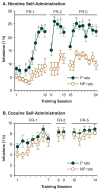Biological processes underlying co-use of alcohol and nicotine: neuronal mechanisms, cross-tolerance, and genetic factors
- PMID: 17373407
- PMCID: PMC6527043
Biological processes underlying co-use of alcohol and nicotine: neuronal mechanisms, cross-tolerance, and genetic factors
Abstract
Alcohol and nicotine are two of the oldest and most commonly used recreational drugs, and many people use both of them together. Although their ready availability likely contributes to the strong correlation between alcohol and nicotine use, several lines of evidence suggest that biological factors play a role as well. For example, both alcohol and nicotine act on a brain system called the mesolimbic dopamine system, which mediates the rewarding and reinforcing properties of both drugs. Modification of the activities of the mesolimbic dopamine system can interfere with the effects of both alcohol and nicotine. Another mechanism that may contribute to alcohol-nicotine interactions is cross-tolerance to the effects of both drugs. Finally, genetic studies in humans and of selectively bred mouse and rat strains suggest that shared genetic factors help determine a person's liability to use or abuse both alcohol and nicotine.
Conflict of interest statement
The authors declare that they have no competing financial interests.
Figures


References
-
- Acheson A, Mahler SV, Chi H, de Wit H. Differential effects of nicotine on alcohol consumption in men and women. Psychopharmacology (Berlin) 2006;186:54–63. - PubMed
-
- Barrett SP, Tichauer M, Leyton M, Pihl RO. Nicotine increases alcohol self-administration in non-dependent male smokers. Drug and Alcohol Dependence. 2006;81:197–204. - PubMed
-
- Bierut LJ, Rice JP, Goate A, et al. A genomic scan for habitual smoking in families of alcoholics: Common and specific genetic factors in substance dependence. American Journal of Medical Genetics. 2004;124:19–27. - PubMed
-
- Bowers BJ, McClure-Begley TD, Keller JJ, et al. Deletion of the alpha7 nicotinic receptor subunit gene results in increased sensitivity to several behavioral effects produced by alcohol. Alcoholism: Clinical and Experimental Research. 2005;29:295–302. - PubMed
-
- Butt CM, Hutton SR, Stitzel JA, et al. A polymorphism in the alpha4 nicotinic receptor gene (Chrna4) modulates enhancement of nicotinic receptor function by ethanol. Alcoholism: Clinical and Experimental Research. 2003;27:733–742. - PubMed
Publication types
MeSH terms
Substances
LinkOut - more resources
Full Text Sources
